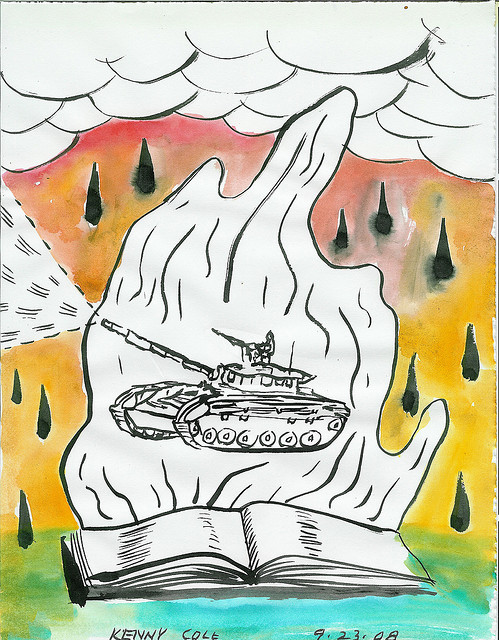America is a stumbling giant seeking a place to rest its head, and yet all-too-often that resting place lies in a quiet retreat from reality.
America is the progenitor of universal values, and yet its people are increasingly small-minded.
America is wild and free, and yet its electorate increasingly votes conservative.
America created the United Nations, then blocked more Security Council resolutions than any other state.
America is an inspiration, and yet somehow always seems to let us down.
The greatness of America is a paradox. Measured in military might, cultural influence, and wealth, America is easily the most powerful nation in the world. But that power is evaporating, and as it dissipates, Americans are retreating into smaller worlds. Like many great empires before it—the Spanish, the Ottomans, the British, the French—America is burdened with debt and military commitments. The American empire is a complex of bases spread across dozens of states. Removing those bases will create power vacuums, to be fought over and filled by other rising powers. The power vacuum of Syria may thus be a sign of things to come, with America vacillating like Hamlet, afraid to either step aside or take his seat, as others rush in and stake a claim.
American power is not only a military but also an economic and a moral burden. As the most powerful nation in the world, Americans tend to feel responsible for those over whom they wield power. But while they may feel responsible, they all-too-often fail to consider their needs, and in their failure commit great harms.
Americans want to feel good about themselves by thinking they are doing good, but you cannot help others whom you cannot even see. Thus, while Americans may experience their empire as a moral burden, others see it as a curse. Still, America brings to the current world order an unusual interest in the good of the world.
American small-mindedness is a peculiar paradox because America has been essential to building a global civilization. The Wilson administration first envisioned the League of Nations, which the Roosevelt administration transformed into the U.N. America brought the World Bank and International Monetary Fund to life, built the Internet, and educated many of the world’s top leaders. It is quite possible that without America, the much more heavy-handed empires of Britain, France, and the Soviets would still rule. Yet, this same global trend-setter also produced the Tea Party and Donald Trump.
Sometimes it seems Americans are simply running from their own global destiny.
But American leaders cannot retreat much further from the world, for at every turn, American power forces them to think globally. And the wider sphere of influence produces a wider range of concerns. American leaders must take responsibility for all of the biggest problems facing humanity or else humanity will see American leaders as the biggest problem. And yet, all of this cosmopolitanism exists side-by-side with mass bigotry in a standing tension with which Americans have long been familiar. There is a narcissism to the way Americans want their country to stand at the center of the world without having to see beyond their own state interests. And that narcissism is fast becoming its own imperial burden.
America has often played the part of its own gravedigger, though, for it created many of the global institutions that would eventually undermine the nation-state as such. The nation-state is being eroded by the interconnectedness of global markets, which America helped build—by stronger international laws, which America helped negotiate, and by a multiculturalism, which America helped pioneer. It is more than a little ironic then that as the world looks more like America, fewer Americans want much to do with the world.
America has protected itself by pointing beyond itself. As Americans regress into a cultural and political tribalism eerily reminiscent of Depression-era fascism, American institutions and traditions point the way to greater cosmopolitan. American culture is a virtual microcosm of the U.N., made up of the descendants of African slaves and Anglo settlers, Native Americans and East European Jews, Italians and Germans, Chinese and Mexicans, Arabs and Indians. America demonstrates how the world might get along.
As America declines, something must take its place, and it is hard to imagine that in an increasingly complex global scene a rising giant like China could do any better. If the recent history of declining empires is any predictor of the future, the next great empire will adopt the major institutions of the last. But the greatest institutions America built were global, and the nation-state itself is slipping away. Hence, the next great empire may be the world itself, a world from which Americans are all-too-often in retreat.
And perhaps this is the greatest paradox of American parochialism: just as the traditions of the world are becoming Americanized, America itself is becoming traditional. Americans may think they are getting back to their roots, but America has always been about bigness, and much of that bigness has lain in building something better than itself. Hence, the more Americans retreat into themselves and ignore the world, the more the world must take America’s seat.
~
This article is a liberally adapted excerpt from Convergence: The Globalization of Mind. If you liked it, please friend the author on Facebook and join the conversation.
Author: Theo Horesh
Editor: Emily Bartran
Photo: Kenny Cole/Flickr







Read 0 comments and reply